
Chief international correspondent
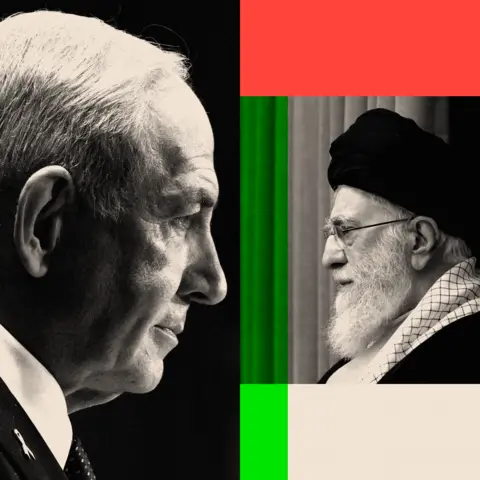 BBC
BBCOn Friday, after Israel launched an unprecedented attack on Iran, its Prime Minister Benjamin Netanyahu addressed Iranians directly. Speaking in English, he told them that the time had come for them to stand up against an “evil and oppressive regime”.
Israel’s military operations were, he announced, “clearing the path for you to achieve your freedom”.
Now, as the military confrontation between Iran and Israel intensifies, and the range of targets widens, many are asking – what is Israel’s real endgame?
 Getty Images
Getty ImagesIs it simply to end, as Netanyahu also declared on Friday on the first night of strikes, “the Islamic regime’s nuclear and ballistic missile threat”?
Was it also to finish off any more talks between the US and Iran, to reach a new negotiated deal to curb Iran’s nuclear programme in exchange for the lifting of painful sanctions?
Or could that message to Iranians about clearing a path to achieve freedom nod to an even bigger aim of trying to bring an end to Iran’s clerical rule?
From generals to Trump: Who has his ear?
The political career of Israel’s longest-serving prime minister has been marked by his personal mission to warn the world of the dangers posed by the Islamic Republic of Iran – from a cartoon of a bomb he’s shown at the United Nations, to his repeated refrain during the last 20 months of a burning regional war that Iran was the biggest threat of all.
American presidents and Netanyahu’s own generals are known to have pulled him back, more than once over the years, from ordering military strikes against Iran’s nuclear facilities.
US President Donald Trump says he didn’t give it a green light. But even what seems to have been at least an amber one seems to have been enough.
“Now he is in, he is all in,” is how one western official described Netanyahu’s game. He also underlined the view that Israel’s main goal was to cripple Iran’s nuclear programme.
That decision has been widely condemned by states across the region, as well as the International Atomic Energy Agency (IAEA) whose Director-General Rafael Grossi underlined: “I have repeatedly stated that nuclear facilities must never be attacked, regardless of the context or circumstances.” They have also been condemned by legal scholars who argue that the strikes are illegal under international law.
But many are now asking whether Israel’s prime minister is pursuing the same goals as his top advisors and allies.
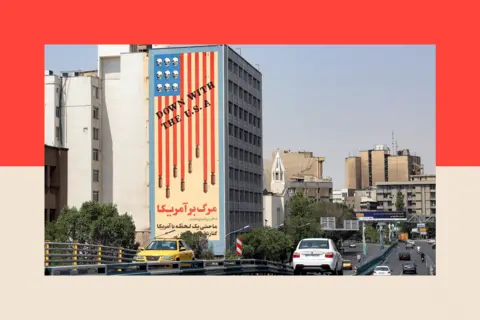 AFP via Getty Images
AFP via Getty Images“While Netanyahu has personally stacked his fortunes on regime change, the Israeli political and military establishment are committed to profoundly setting back Iran’s nuclear program,” says Dr Sanam Vakil, Director of the Middle East and North Africa programme at the Chatham House think tank.
“The latter might be difficult but somewhat achievable,” she adds. “The former looks harder to deliver in a short and intensifying conflict.”
Destroying Iran’s nuclear programme
Netanyahu cast Israel’s operation as pre-emptive strikes to destroy an existential threat. Iran’s advance, he declared, was “at the 90th minute” towards the development of a nuclear bomb.
Western allies have echoed his declaration that Tehran must not be allowed to cross this line. But Netanyahu’s clock has also been widely queried.
Iran has repeatedly denied it has decided to build a bomb. In March, Tulsi Gabbard, the US Director of National Intelligence, testified that the US intelligence community “continues to assess that Iran is not building a nuclear weapon”.
The IAEA said in its latest quarterly report that Iran had amassed enough uranium enriched up to 60% purity – a short, technical step away from weapons grade, or 90% – to potentially make nine nuclear bombs.
In these first few days, three key facilities in Iran’s vast programme have been targeted – Natanz, Isfahan, Fordow. The IAEA has said that a pilot fuel enrichment plant, above ground, at Natanz was destroyed.
The IAEA also reported that four “critical buildings” were damaged at Isfahan. Israel describes the damage to Iran’s facilities as “significant”; Iran says it’s limited.
And Israel is also striking “sources of knowledge” by assassinating, so far, at least nine nuclear scientists and a growing list of top military commanders. Its list of targets, which includes military bases, missile launch pads and factories, is now widening to economic and oil facilities.
Iran is also hitting back with its own expanding hit list as civilian casualties mount in both countries.
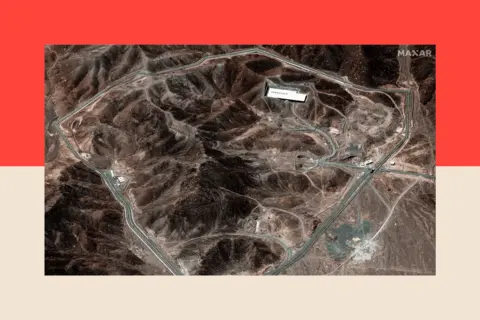 Maxar Technologies/ Getty Images
Maxar Technologies/ Getty ImagesBut to deal a decisive blow to Iran’s vast nuclear programme, Israel would have to do significant damage to Fordow, its second-largest and most heavily protected site. The complex, deep underground in a mountain, is where some experts believe Iran has stockpiled much of its near weapons-grade uranium.
Reports in Israeli media say the current aim is to try to cut off access to the facility.
Israel doesn’t have the bunker-busting bombs it would need to smash through so much rock. But the US Air Force has them. They’re known as MOP – the precision-guided 30,000lb Massive Ordnance Penetrator. But it would still take many strikes, over many days, to cause major damage.
“I think the most likely scenario is that Netanyahu will call Trump and say ‘I’ve done all this other work, I’ve made sure there is no threat to the B-2 bombers and to US forces but I can’t end the nuclear weapons programme,'” Richard Nephew, former US official and Iran expert at the Columbia University Center on Global Energy Policy, told the BBC’s Newshour programme.
A Western official told me, “It’s still not clear which way President Trump will jump.”
Timed to derail peace talks?
Trump keeps veering back and forth. At the start of last week, he urged Israel to stop threatening Iran militarily because an attack could “blow it” when it came to the nuclear negotiations with Iran he’s always said he much prefers.
Once Israel attacked, he praised the strikes as “excellent” and warned “there’s more to come, a lot more”. But he also mused they could help push Iran towards making a deal.
Then in a post on Sunday on his Truth Social platform, he declared “We will have PEACE, soon, between Israel and Iran! Many calls and meetings now taking place.”
Iran’s negotiators now suspect that the talks, which were set to resume in the Omani capital Muscat on Sunday, had all been a ploy to convince Tehran an Israeli attack was not imminent, despite mounting tensions. Israel’s blistering salvos on Friday morning caught it off guard.
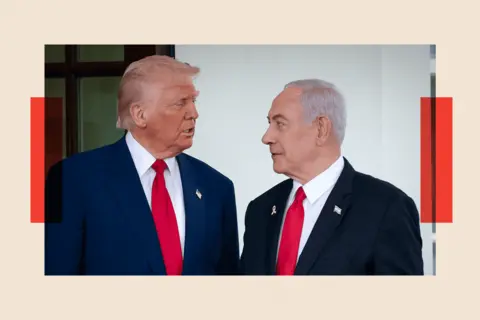 Getty Images
Getty ImagesOthers also see the timing as significant. “Israel’s unprecedented strikes were designed to kill President Trump’s chances of striking a deal to contain the Iranian nuclear programme,” says Ellie Geranmayeh, deputy head of the Middle East and North Africa programme at the European Council on Foreign Relations.
“While some Israeli officials argue that these attacks aimed to strengthen the US leverage in the diplomatic path, it is clear their timing and large-scale nature was intended to completely derail talks.”
Officials with knowledge of these negotiations had told me last week that “a deal was within reach”. But it all depended on the US moving away from its maximum demand for Iran to end all nuclear enrichment, even from much smaller single-digit percentages commensurate with a civilian programme. Tehran viewed that as a “red line”.
After President Trump pulled out of the landmark 2015 nuclear deal in his first term, partly under repeated urging from Netanyahu, Iran moved away from its obligation to restrict enrichment to 3.67% – a level used to produce fuel for commercial nuclear power plants – and started stockpiling too.
In this second attempt, the US leader had given Iran “60 days” to do a deal – a window viewed by mediators with experience and knowledge of this field as far too small for such a complex issue.
Israel attacked on the 61st day.
“The Oman channel is dead for the time being,” says Dr Vakil. “But regional efforts are underway to de-escalate and find off ramps.”
Netanyahu’s ‘Churchillian mood’
Viewed from Tehran, this escalation is not just about stockpiles, centrifuges, and supersonic missiles.
“They see it as Israel wanting to, once and for all, downgrade Iran’s capabilities as a state, its military institutions, and change the balance of power between Iran and Israel in a decisive way, and perhaps topple the Islamic Republic as a whole, if it can,” argues Vali Nasr, Professor of Middle East studies and International Affairs at Johns Hopkins School of Advanced International Studies and author of the 2025 book Iran’s Grand Strategy.
It’s unclear how the Iranian public might respond.
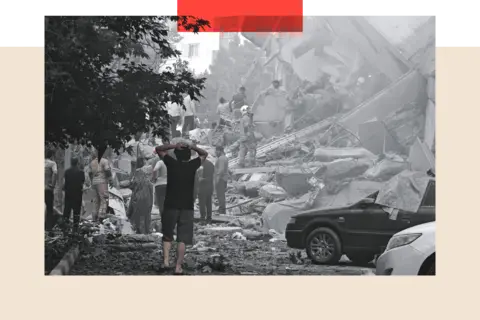 Getty Images
Getty ImagesA nation of 90 million people has suffered, for years, the effects of swingeing international sanctions as well as systematic corruption. Protests have flared, year after year, on issues ranging from high inflation to low employment, shortages of water and electricity to the zeal of morality police restricting women’s lives. In 2002, unprecedented waves of protests demanded greater freedoms; they were met by a harsh crackdown.
Mr Nasr offers his assessment of the public mood now. “Maybe at the beginning, when four or five very unpopular generals were killed, they may have felt a sense of relief, but now their apartment buildings are being hit, civilians have been killed, and the energy and electrical infrastructure of the country is under attack,” he says.
“I don’t see a scenario in which the majority of Iranians are going to side with an aggressor against their country while it’s bombing it, and somehow view that as liberation.”
But Netanyahu’s statements keep hinting at broader targeting.
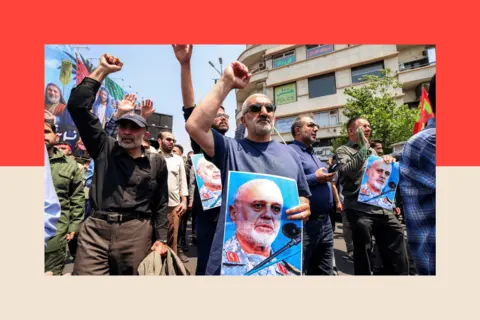 AFP via Getty Images
AFP via Getty ImagesOn Saturday, he warned his country will strike “every site and every target of the ayatollah regime”.
On Sunday, when specifically asked by Fox News if regime change was part of Israel’s military effort, Israel’s premier replied it “could certainly be the result because the Iran regime is very weak”.
“They want to play to the regime’s fears of losing control as part of their psychological warfare,” says Anshel Pfeffer, Israel Correspondent at The Economist and author of a biography of Netanyahu.
“The consensus within Israeli intelligence is that predicting or engineering the downfall of the Iranian regime is pointless. It could happen soon, or in 20 years.”
But Mr Pfeffer believes the prime minister’s thinking may be different. “I think there’s a good chance that Netanyahu, unlike his spy chiefs, actually believes in the message; he is in a Churchillian mood.”
By Sunday evening, reports started appearing on US media, each citing their own sources, that President Trump had vetoed in recent days an Israeli plan to kill Iran’s Supreme leader Ayatollah Ali Khamenei. The buzz began when Reuters first broke the story quoting two anonymous US officials.
Israeli figures questioned on their aims, from the foreign minister Gideon Sa’ar to the National Security Council Chief Tzachi Hanegbi, have emphasised their focus is not on Iran’s political leadership. But Hanegbi added a coda – “but the concept of ‘at the moment’ is valid for a limited time.”
In the end, the contours of this endgame will be shaped by the course of a perilous and unpredictable confrontation, and an unpredictable US President.
“Success or failure is overwhelmingly being defined by whether the US can be dragged in,” assesses Daniel Levy, President of the U.S. Middle East project and former Israeli government advisor. “Only the US can bring this to a timely end-point in the near future by determining outcomes and stop points.”
Top picture credits: Anadolu via Getty, ATEF SAFADI/EPA – EFE/REX/Shutterstock
BBC InDepth is the home on the website and app for the best analysis, with fresh perspectives that challenge assumptions and deep reporting on the biggest issues of the day. And we showcase thought-provoking content from across BBC Sounds and iPlayer too. You can send us your feedback on the InDepth section by clicking on the button below.
www.bbc.com
#Israels #operation #heading





